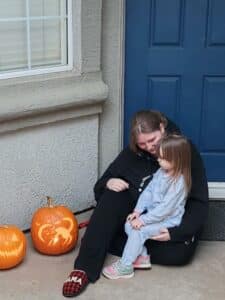 Play dates. Cartoons. Toys.
Play dates. Cartoons. Toys.
These are some of the words that describe Cody Van Felden’s life these days. With a child of her own, she’s busier than ever, but she wouldn’t change a single moment. “Emotionally, it’s the greatest feeling in the world to be a parent,” she said. When she reflects on her path to parenthood, however, a few different words jump out at her.
Devastating. Gut-wrenching. Fear.
Based on a newly released report by the California Department of Social Services, these words also describe the experience of pregnant foster youth across the state. This landmark report is a result of the Healthy Futures for Foster Youth Act (AB 172), authored by Assemblymember Blanca Rubio and co-sponsored by John Burton Advocates for Youth (JBAY) in 2021. The legislation requires an annual report on the reproductive health outcomes of foster youth, the first of its kind nationally.
The report validated the lived experience of young people like Cody. It found that foster youth were less likely to receive timely prenatal care, which means lost opportunities for early screening for pregnancy risks and complications. It also found foster youth were less likely to receive post-natal care and more likely to give birth to low-weight infants.
Cody’s experience backs up these results. “I was doing all these tests for my sexual health, but I didn’t know I was supposed to be doing blood tests. I was never told by my parents or doctors that it was necessary, and so I never knew I had a serious undiagnosed infection. I ended up requiring [intravenous] antibiotics for two weeks straight while I was pregnant. It was rough,” she recalled.
Despite her challenges during pregnancy, she remains optimistic about the future of reproductive health care for foster youth. “Having access to the [annual] data tells us where there’s gaps. There’s still a lot more to be done, especially for foster youth that don’t have access to reproductive health education, but it’s amazing seeing the data,” she said.
Cody is bringing her expertise to the topic as a member of the youth advisory board of the Reproductive Health Equity Project. She presented on the findings on a November 14th webinar attended by over 200 people across California.
According to Simone Tureck-Lee, Housing and Health Director for JBAY, while reports can be helpful in providing data, they also create value when it comes to action. “Now that this data is available, service providers can design interventions that reach pregnant foster youth where and when they need it most. Just as JBAY advocated for the law that produced this report, we will continue to advocate for policies that improve the health and wellbeing of foster youth across California,” she said.
When asked, Cody had a few new words to describe how she’s feeling as the proud parent of a two-and-a-half-year-old.
Joyful. Empowered. Motivated.
Now that we have the data, the ability of these words to describe all pregnant foster youth is well within reach. To learn more about this landmark report, click here.
